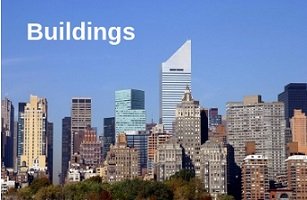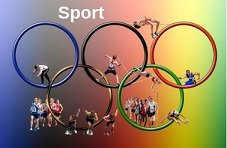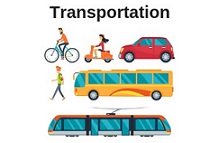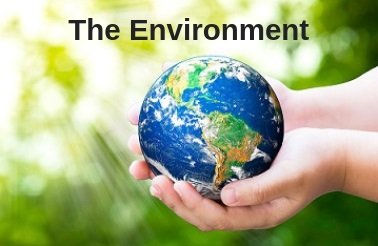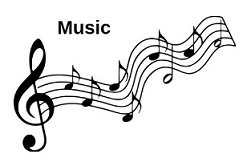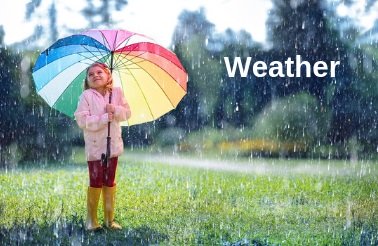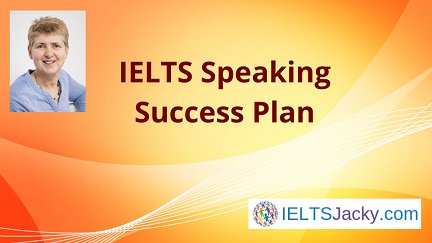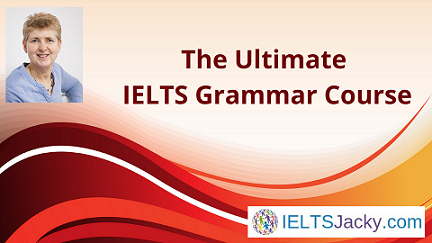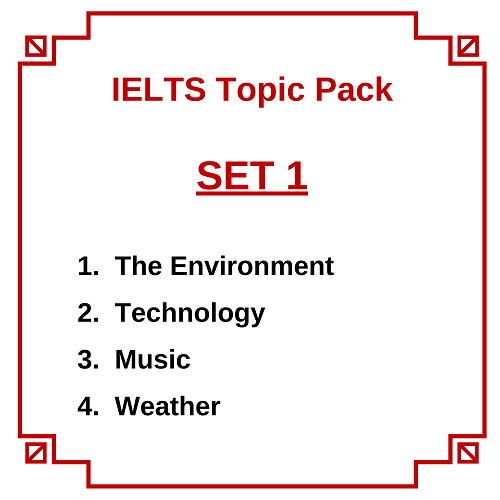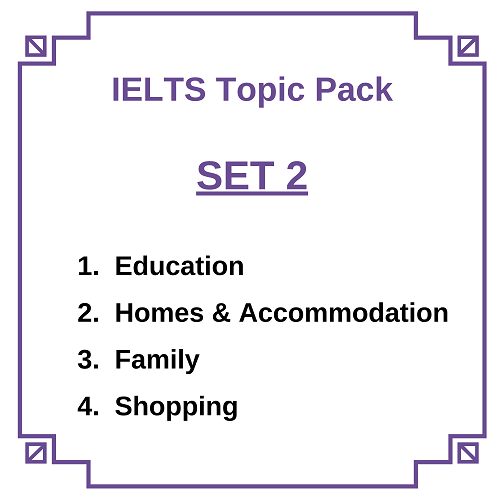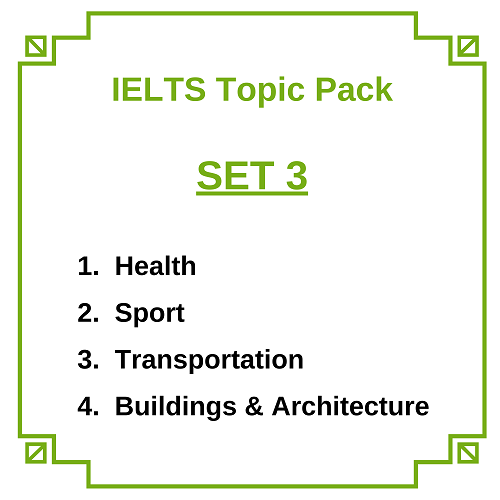Education Vocabulary
It’s very common for candidates to be asked about their school, college or university experience, so a good range of education vocabulary is something you definitely need to develop.
This page should make that easy for you as it contains over 150 everyday words and phrases related to study, education and teaching. For each, I’ve included an explanation and added a sample sentence to show it in context. This will help you to learn how to use it correctly.
Don’t try to learn them all. Look at my suggestions below as to the best way to use this extensive list of education vocabulary.
Here are some of the categories covered:
- Educational institutions
- Course types & levels
- Qualifications
- People in education
- Subjects & facilities
- Academic work
As
well as your own experience of education, you could be asked your opinion on wider
issues such as the quality of teaching or education system in your country, equal
opportunities, technology in schools and many other related topics. The list
of education vocabulary will equip you to create answers for these types of subjects
as well.
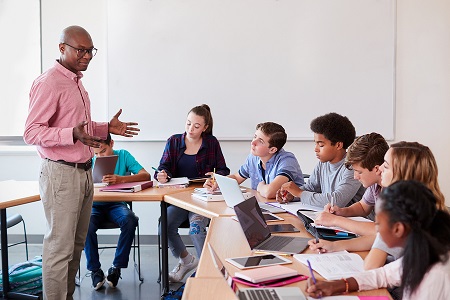 In the classroom.
In the classroom.Also on this page are three other things that will help you prepare for questions about education:
- IELTS-style questions on the topic of education
- Sample answers
- Links to online reading &
listening resources
You’ll find
PDF downloads of both the questions and sample answers and the education vocabulary
list at the bottom of the respective sections.
The questions relate to the Speaking test because this part of the exam offers the broadest range of possible questions on the topic of education. They give the best opportunity for me to demonstrate the vocabulary and for you to practise using it.
I’ve included IELTS-style questions and answers for all three parts of the Speaking test. I've highlighted key words and phrases in bold.
You'll find these words and phrases, and many others, in the vocabulary list beneath. There’s an audio to listen to their pronunciation.
The education vocabulary list contains words and phrases relevant to all parts of the IELTS exam.
Finally, at the bottom of the page I've added links to topical articles, short videos and podcasts that will help you to improve both your education vocabulary and your reading and listening skills.
Let’s begin with the sample questions.
IELTS-Style Speaking Test Questions and Answers
Common education vocabulary is highlighted in bold.
Part
1
1) At what age do children begin school in your country?
Formal education starts at five years of age but most children go to preschool when they are around three. This isn’t compulsory but really helps them to develop socially.
2) What kind of school did you go to as a child?
My family moved around a lot when I was growing up so I went to many different schools including three primary schools, a grammar school and a co-educational comprehensive school. I even attended a private school for a year.
3) Did you enjoy your time at school?
I can’t say that I particularly enjoyed my early education. With changing schools so often, I was always the new kid which I found hard.
4) Would you say you were a good student?
Yes, I was definitely a good pupil. I was a quiet, shy child who never caused my teachers any trouble or played truant. I worked hard on my coursework and got on well with my peers.
5) Did you do any extra-curricular activities?
Back in my day, there weren’t many opportunities to do extra-curricular activities. However, I was in the school choir at my secondary school. We use to put on concerts and one year we did a tour of Germany.
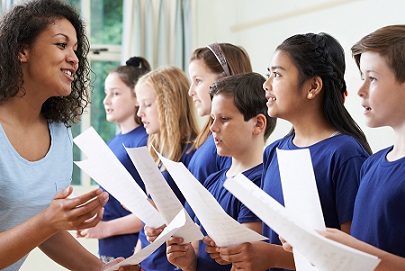 Singing in the school choir is a popular extra-curricular activity.
Singing in the school choir is a popular extra-curricular activity.Part 2
Describe a subject you enjoyed studying at school.
You should say:
- when and where you started studying it
- what lessons were like
- what made it different from other subjects
and explain why you enjoyed the subject.
There There were three subjects I particularly enjoyed at school, English, geography and P.E. but if I had to choose a favourite, I guess it would be geography.
I suppose you start learning about the natural features around you and other countries in primary school but geography first appeared on the curriculum as a specific subject in secondary school. I’d been fascinated with other places and cultures for as long as I could remember. My dad had travelled a lot and had a large map on the wall with pins in all the countries he’d been to. I loved looking at it so perhaps that’s where my interest in geography first started.
The geography classroom was great; full of globes, atlases and books about places that were very different to where I lived. We had a nice teacher called Mrs Rose who used lots of pictures and maps in her lessons. This was perfect for me as I’m a visual learner. If Mrs Rose had just talked all the time, as some of our teachers did, I probably wouldn’t have enjoyed the subject so much or learnt so easily.
I even liked doing geography homework. I can remember sitting at my desk at home spending hours carefully drawing maps and adding all the features. When my mum took me to the library on a Saturday morning, I’d look for adventure stories set around the world or books on how people live in other countries.
When I reached the sixth form and had to choose just three subjects to study, geography was one of them, although I actually failed my final exam. My family moved house yet again just before I took it and I was very unsettled. I had a private tutor for a few months then retook the exam and got a good grade.
At university, I trained as a teacher myself. I chose primary education so taught geography along with many other subjects. However, during one of my training placements, the headteacher asked me to spend three weeks teaching the subject to every class in the small village school, from 5 year olds up to 11 year olds. It was one of the happiest times in the whole of my career even though I hadn’t even got my teaching qualification yet.
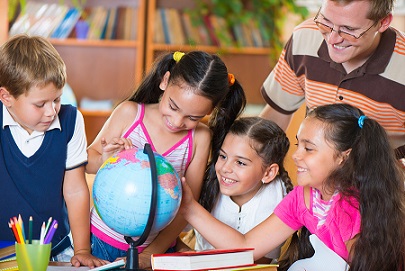 Pupils looking at a globe in a geography lesson.
Pupils looking at a globe in a geography lesson.Part 3
1) What impact do universities have on the places where they’re located?
I believe that the presence of a university in a town or city has a significant positive impact on the area. For a start, it's often the largest employer, offering jobs at all levels from cleaners and maintenance staff to lecturers and top academics.
Large educational institutions like this bring in lots of investment from around the world from foreign students and for important research projects. The presence of thousands of students during term times is also a massive boost to the local economy.
In addition to the financial benefits, there several ways in which universities contribute socially. For example, university towns and cities tend to be vibrant, with a great social life due to the large numbers of young adults living there. What’s more, the campus itself usually has a number of facilities that can be used by local people. A university city I used to live in had an excellent theatre that attracted top plays, shows and performers from around the country.
2) What is it more important for academics to do, research or teaching?
It was only recently, after reading an article about a local university, that I realised just how much research goes on in them. It was about a new facility in the medical faculty and outlined the important research they will now be able to carry out on stem cells and brain tumours. This type of work is vital if we are to combat illness and disease in the future.
For most people though, universities are places of learning where you go to get your degree and prepare for your future career, so teaching must have a high priority. As teachers, academics have the role of passing on knowledge to the next generation.
Weighing it up, I think that the teaching side of their work is the most important because unless they instruct and inspire their students, there will be no-one to fill the most important jobs in society or to carry on the research work the academics do.
3) What are the advantages of studying a distance learning course?
For many people, especially mature students who work, distance learning is the ideal way to study. There are several benefits that immediately come to mind. Firstly, the cost is far less than it would be to attend a college or university with their high tuition fees.
Secondly, you can study anywhere and in your own time and at your own pace. Some students, myself included, find that this method of learning suits them better than sitting in lectures or going to tutorials. You do have to be self-motivated to keep up with the coursework though, and you still get assignments to write and sometimes a dissertation, but you can fit these around your daily life.
Thirdly, there’s a huge range of correspondence courses and online courses available these days so you can take almost any subject you want to and even study for a degree qualification this way. So all in all, distance learning courses have many advantages over other methods of study.
 Students graduating from university.
Students graduating from university.Click
this link to get a PDF download of these practise questions & sample
answers.
Education Vocabulary
* Important
- Do not try and learn this list of education vocabulary.
- Identify the vocabulary you find useful for answering practise questions about this topic.
- Record it in your vocabulary notebook and practise using it regularly.
I recommend that you create your own answers to the Speaking
questions on this page. You will find many other IELTS-style practise questions
by searching online.
For help on how to learn vocabulary, what to learn and how to record it, visit these pages:
How to Learn Vocabulary for IELTS
Top 6 Types of IELTS Vocabulary & Topic Word Lists
Education Vocabulary – Common Words & Phrases
Education Vocabulary Set 1: Key Definitions
education – the process of teaching or
learning, especially in a school, college or university, or the knowledge that
you get from this
- Education is a low priority for the governments of some developing countries.
- Most children receive their education in schools but some are taught at home.
to educate – to give someone intellectual, moral or social instruction, typically at a school, college or university
- At the school I visited in Kenya the children are educated in classes of over 60 pupils.
educational – relating to the provision of education
- When I was at school we had an educational visit to the British Museum in London to see Tutankhamun’s treasures.
educational institution – a place where people gain an education, such as a school
- We are fortunate to have many excellent educational institutions in our area.
formal education – education normally delivered by trained teachers in a systematic way in a school, college or university.
- In Norway, formal education starts when children reach the age of six.
compulsory education – the legally-required period of time that children are expected to attend school. In the western world, these laws generally require that children attend school from the ages of 5 to 16 or 18.
- One day, a formal education will hopefully be compulsory for all children.
Education Vocabulary Pronunciation
Education Vocabulary Set 2: Educational institutions
preschool – a school for children who are too young to begin their formal education
- Most children in the UK go to a preschool but it isn’t compulsory.
nursery school (UK)/kindergarten (US) – preschool education
- In the UK, most children begin nursery school at the age of four.
primary school (UK)/elementary school (US) – the type of school for children ages 5-11
- Bindi was so excited about starting primary school when the new term started in September.
primary education – the education of 5-11 year olds
- In an ideal world, primary education would be compulsory in every country.
secondary school (UK)/high school (US) – the type of school for children age 11 to 16, sometimes 18
- I want to teach in a secondary school when I finish my teacher training as I really enjoy working with older pupils.
co-educational/mixed – a school where girls and boys are taught together.
- These days, most schools in the UK are co-educational.
single-sex school – a school for either male or female students but not both
- Both my parents went to single-sex schools but it’s more normal these days to go to a mixed school.
state school – a school that is funded and controlled by the government and for which no fees are charged
- The government is facing growing criticism for the underfunding of state schools.
comprehensive school – a state school that accepts pupils regardless of their level of academic ability or achievement
- There is an ongoing debate as to whether all young people should attend comprehensive schools or if schools that select pupils on academic ability are still relevant.
grammar school (UK) – state secondary school that selects their pupils by means of an examination taken by children at age 11
- Although many people are against selective education where some school places go to the most academically able pupils, grammar schools are still popular.
private school – a school that is not supported by government money, where education must be paid for by the children’s parents
- Jonah’s parents decided to pay for him to go to a private school because most classes only had 20 pupils in.
private education – education parents have to pay for
- Only a small percentage of parents can afford to give their children a private education.
public school (UK) – an exclusive, expensive school, run independently
public school (US) – a school which is free and paid for by the government
higher education (also called tertiary education) – education beyond the age at which it is compulsory, usually in a college or university
- Most of Vijay’s friends wanted to leave school and get a job as soon as possible but he was determined to go on to higher education to improve his career prospects.
boarding school – a school where students live and study during the school term.
- Yu Yang hated boarding school as she missed her family and felt very homesick.
college – a place of higher education where people study specialized subjects or undertake vocational training for a skilled job
- Hugo applied for a place at the local college to train to be a chef.
university – a high-level educational institution where students study for degrees and academic research is done.
- Fuyuko wanted to study nursing at university in Australia but had to get a band 7 in her IELTS exam to be accepted.
Education Vocabulary Pronunciation
Education Vocabulary Set 3: Course types & levels
course – a series of lessons in a particular subject
undergraduate – studying for a degree but having not yet achieved it.
postgraduate – having
achieved a degree and now studying for a higher qualification, possibly a
professions qualification
vocational – education or training directed at a particular occupation and its skills, often requiring practical skills
intensive – fast-paced courses which give a lot of information quickly and in a short time
Education Vocabulary Pronunciation
Education Vocabulary Set 4: Qualifications
qualification – an official record showing that you have achieved a certain level of education or skill in a particular subject or skill area
- Riya was determined to leave school with good qualifications so she could get a well-paid job to support her family.
certificate – an official record of achievement, generally issued for a short course
- Shona was delighted to be presented her TEFL certificate on passing her course to become an English teacher.
diploma – issued for a higher education course that is shorter than a degree
- Greg did so well in his two-year engineering diploma that his tutor persuaded him to study for another year to qualify for a degree.
bachelor’s degree/or just degree (BA/BSc etc) – qualification issued by a university or college at the end of three or four years of study
- I’m studying for a bachelor’s degree in marine biology.
- I’m studying for a BA in history.
master’s degree/or just master’s (MA/MSc etc) – qualification issued by a university when the student has completed further study beyond a degree, often in a more specialisn'ted field than a bachelor’s degree
- Alonso wanted to stay on at university an extra year to study for his master’s but his parents couldn't afford the fees.
doctorate (PhD) – the highest level of degree qualification issued by a university
- I’m so proud of my sister for achieving a PhD in biochemistry.
fellowship – a teaching or research post given to a person studying for an advanced degree.
- Being awarded a research fellowship at my university is a dream come true as it enables me to stay on and study for my doctorate.
Education vocabulary Pronunciation
Education Vocabulary Set 5: People in education
headteacher/principal – the person in charge of a school
- Our headteacher had been principal for 12 years when he retired.
teacher – a person who teaches, especially in a school
- My favourite teacher at school was Mr Webber because he made lessons so interesting.
tutor – a teacher who works privately with one student or a small group
- Our son struggles with maths so we’ve got him a private tutor to help him with his work.
lecturer – a person who teaches at a college or university.
- My cousin is a lecturer in physics at the University of London.
professor – a teacher of the highest rank in a department of a British university, or a teacher of high rank in an American university or college
- Professor Stephen Hawking was one of the most influential figures in modern science.
an academic – a person who teaches in a college or university and continues to research and increase knowledge about their specialist subject
- She was such a bookworm at school and always in the library researching some topic or other, so it’s no surprise that she became an academic.
pupil – a person, usually a child at school, who is being taught
- The pupils loved Miss Lefebvre’s French lessons as she gave them fun learning games to play.
student – a person, usually a college or university, who is being taught
- The beginning of the academic year was so busy with all the new students starting their college courses.
mature student – an adult student who attends college or university some years after leaving school
- Jose was so grateful for the chance to study for a degree as a mature student having left school with very few qualifications.
a graduate – a person who has finished their college or university education
- University graduates can usually get higher paid jobs than people with vocational skills.
peer – a person who is in the same class, age group or social group as someone else
Pupils these days are under a lot of pressure to dress and behave like their peers.
Education Vocabulary Pronunciation
Education Vocabulary Set 6: School subjects
curriculum – the subjects comprising a course of study in a school or college
- Her parents chose the school because it offered a broad curriculum including drama and dance which were her favourite subjects.
syllabus – an outline or summary of the subjects to be covered in a course
- The new syllabus included environmental science which was becoming more popular as a school subject.
maths/math/mathematics – the study of numbers, shapes and space
literature – the study of written works (such as poems, plays, and novels) that are considered to be very good and to have lasting importance
the three R's – the basic educational skills of reading, writing and arithmetic (maths)
- Most schools put a high priority on teaching the three R's.
language – a system of communication used by a particular country or community often studied as a subject by non-native speakers
- To her surprise, Jenna found that she was quite good at languages at school.
humanities – studies about human culture, such as literature, languages, philosophy, and history.
- Tuma couldn’t decide whether to study history or philosophy at university so opted for a degree in humanities.
science – the study of the structure and behaviour of the physical world, divided into subjects such as physics, biology and chemistry
- physics – the branch of science concerned with the nature and properties of matter and energy
- biology – the study of living organisms
- chemistry – the branch of science concerned with the substances of which matter is composed
Education Vocabulary Pronunciation
geography – the study of the physical features of the earth and its atmosphere, and of human activity as it affects and is affected by these
religious studies – the study of religion and belief systems
history – the study of past events, particularly in human affairs
information technology (IT or ICT) – the study of the development, maintenance, and use of computer systems, software, and networks for the processing and distribution of data
physical education (PE) – instruction in physical exercise and games, especially in schools
art – the study of artistic techniques such as drawing, painting, sculpture, etc. or the appreciation of works of art
music – the study of how to play a musical instrument or sing, how to read music, how to compose music, etc
drama – the study of acting and theatrical performance
home economics – cooking and other aspects of household management, especially as taught at school
Education Vocabulary Pronunciation
Education Vocabulary Set 7: School vocabulary
to play truant – to be absent without permission from parents or teachers
- Helios was always playing truant from school which he regretted when he failed his exams and struggled to find a good job.
to skip classes – to be absent from lessons you are supposed to attend
- I was never brave enough to skip classes as my parents would have been furious if they’d found out.
bookworm – a person who loves reading and/or studying
- My best friend is a real bookworm but is a great person to have on your quiz team because his general knowledge is excellent.
rote learning – a teaching style based on learning by memorisation through repetition
- My parents’ education was based on rote learning but there was more emphasis on learning by investigation by the time I went to school.
literacy – the ability to read and write, sometimes use as a subject title for reading and writing
- Afghanistan has one of the lowest literacy rates in the world with just 28% of people able to read and write.
literate – to be able to read and write
- In the past 20 years, the proportion of adults in the world who are literate has increased from 75% to 84% which is a great improvement.
illiterate – to be unable to read and write
- There are many children in the poorest countries of the world who have little or no access to education and are illiterate.
remedial – involving pupils who need extra help with a particular area of study or subject
- Pupils who got poor grades use to be put in a remedial class but now they are given extra support from a learning assistant.
additional needs/special needs – related to students who need special help due to a learning or physical difficulty
- Shona spend the later part of her teaching career working in a school for students with additional needs.
extra-curricular activities – activities or subjects offered in addition to the normal curriculum usually offered outside normal class hours, such as art, cooking or computer clubs and extra sporting activities
- The most popular extra-curricular activities at Westcroft School were pottery, badminton and computer programming.
school uniform – a particular set of clothes that has to be worn by pupils
- Do Hyan looked so smarting setting off for school on his first day wearing his new school uniform.
discipline – a set of rules governing conduct or behaviour
- Schools where a high level of discipline is maintained, generally have above average exam results
- impose discipline
- maintain discipline
- lack of discipline
timetable – a chart showing times of particular events, such as lesson times in the school day
- Ruby wasn’t very happy with her new timetable as she had double maths followed by double science on a Monday, both subjects she found hard.
Education Vocabulary Pronunciation
Education Vocabulary Set 8: Facilities
classroom – where lessons take place in a school
- The noisy classroom fell silent when the headteacher walked through the door.
lecture theatre/hall – a room or hall for lectures with seats in tiers
- There was excitement in the lecture theatre as the famous actor stood up to give the drama students a lecture on method acting.
studio – a room where students studying art, photography, media studies, etc. create work
- The studio was set up with recording equipment for the students to practice editing techniques.
library – a building or room containing collections of books, professional journals and other academic literature and material relevant to student's studies
- Sabiha spent all day in the university library doing research for her essay on globalisation.
laboratory – a room or building with scientific equipment for doing scientific tests or for teaching science
- Kate’s favourite part of her degree course in molecular biology was the laboratory work.
campus – the buildings and grounds of a university or college
- It took me a long time to find my way around the campus when I first started at university.
halls of residence – a college or university building where students live
- In his first year at college, Somchai lived in a hall of residence, but in his second year, he rented a house with some other students.
student accommodation – living accommodation for college or university students
- The university offered a range of student accommodation including studio apartments, flats, halls of residence and shared houses.
Education Vocabulary Pronunciation
Education Vocabulary Set 9: Academic work
assignment – a piece of work given to someone as part of their studies
- I have three more written assignments to complete this term.
coursework – written or practical work done by a student during a course of study, often assessed in order to count towards a final mark or grade
- Helga was really bad at exams so she chose a course where 50 per cent of the overall marks came from assessed coursework.
dissertation – is a long formal piece of writing on a particular subject, especially for a university degree.
- It was hard getting my dissertation finished by the deadline and I handed it in on the very last day.
thesis – a long piece of writing on a particular subject, especially one that is done for a higher degree
- Adao wrote his PhD thesis on the effect of organic fertilizers on soil fertility in tropical climates.
presentation – a speech or talk given in front of an audience
- As part of their end of year assessment, the students had to give a presentation on the theories of learning for children under 3 years of age.
lecture – a formal talk on a subject given to a large group of students who would normally take notes
- She was so pleased that the lecture was cancelled as it gave her time to catch up on some coursework.
tuition – teaching or instruction, especially of individual pupils or small groups
- Dana was unable to get to lectures after breaking her leg but the college provided individual tuition for her until she recovered.
tutorial – a small group study session with a tutor often following a lecture
- He always found tutorials helpful as it was a chance to ask questions about what they’d heard in the lecture.
seminar – a class at university in which a specific topic is discussed by a teacher and a small group of students
- At university, I found seminars far more useful than lectures as I learn best in a small group.
lesson – a period of learning or teaching, usually in a school
- Walter was late for the history lesson and got into trouble with the teacher.
homework – additional coursework work given to pupils to complete in their own time outside school hours
- Most pupils hate homework as they’d rather be out with their friends or playing computer games than studying.
correspondence course – a course of study in which student and tutors communicate by post
- Juan’s local college didn’t offer a course in accountancy but he found a good correspondence course to give him the qualification he needed.
distance learning – a way of studying in which lectures are broadcast or lessons are conducted by post or via the internet without the student needing to attend a school or college or have in-person teacher interaction
- I prefer to study by distance learning as I can work when I want and at the pace I want.
online learning – Similar to distance learning but done 100% via the internet and often involving in-person interaction with a teacher online
- I find online learning ideal for preparing for my IELTS exam and enjoy connecting with my teacher via Skype.
to sit an exam – to take an exam.
- I want to carry on learning for the rest of my life but after I finish my training I hope I never have to sit an exam again.
Education Vocabulary Pronunciation
Education Vocabulary Set 10: The cost of education
tuition fees – the money paid for a course of study, especially at a private school or a college or university
- High tuition fees mean that many young people can’t afford to go to university.
a grant – money given by the government to support a student while studying
- Bernice was successful in her application for a grant which meant that she could attend her local university.
a student loan – money which a student can borrow while they are studying, but which has to be repaid
- Geraint took out student loans of £9000 a year to pay for his tuition of fees and left university heavily in debt.
a scholarship – money given to someone, often by the institution they are studying at, to help pay for their tuition
- He was overjoyed to receive a scholarship to Oxford University as his parents couldn’t afford to pay the fees.
internship – a period of work experience (often unpaid) offered by an employer to give students and graduates experience of working in an industry related to their field of study
- All students on the course were expected to secure an internship during the long vacation between the second and third years of their degree course.
Education Vocabulary Pronunciation
Education Vocabulary Set 11: Common terms related to college or university
unconditional offer – the offer of a place at an educational institution for which you already meet the entry requirements
- Mustafa was delighted to receive an unconditional offer from his first choice university and accepted immediately.
conditional offer – the offer of a place at an educational institution which requires you to meet certain entry requirements, usually specific exam grades
- She was fairly confident that she would get the exam grades she needed to take up the conditional offer at Bristol University.
to major in – to choose as your main subject
- I want to major in primary education with a specialism in science.
to read (a subject) – to study a specific subject
- Hans read geology at university and is now working for an oil company in the States.
faculty – department in a university that specialises in a specific subject
- It was a proud day for the university when the faculty of science move into the new, state-of-the-art building.
research – a detailed study of a particular subject
- I’m really enjoying this research project on the migratory behaviour of the golden eagle.
Education Vocabulary Pronunciation
Education Vocabulary Set 12: More common words, phrases & expressions
to work your way through university – to have a paid job while studying to support yourself financially
- With the steep increase in tuition fees, many students are forced to work their way through university.
to keep up with your studies – to not fall behind with your work
- Giang would have to limit his time socializing with his friends if he was going to keep up with his studies.
to fall behind with your studies – to not get your coursework and assignments done in the time allowed
- She was a hard-working student but fell behind with her studies after catching pneumonia and having to spend time in hospital.
to learn something by heart – to memorise it
- By the end of his first week learning English, Elisha had learnt all the days of the weeks and months of the year by heart.
gap year – a period, typically an academic year, taken by a student as a break between school and university or college education
- Many students spend their gap year travelling to get more experience of life before they settle down to studying for a degree.
to take a year out – to take a gap year
- Before going to the university, I took a year out to travel and also earn some money.
to enrol – to officially register on a course at a college or university
- She didn’t know an old friend had enrolled on the same course until they met up on the first day.
sign up for – to commit to something for a specific period such as the duration of a course
- Having signed up for the photography course, she now had to ask her brother if she could borrow his camera.
to drop out – to leave a course before completing it
- Hiran was forced to drop out of university when his father became ill and he had to take over the family business to support his family.
a dropout – a student who fails to complete a course of study and leaves the educational institution with no qualifications
- Many famous and very wealthy entrepreneurs are college dropouts, which proves that you don’t need a degree to succeed in life.
Education Vocabulary Pronunciation
well-educated – someone who has received a high level or good standard of education
- You could tell that he was well-educated by the way he spoke.
to meet a deadline – to complete a piece of work by the required date
- I didn’t think I’d get my essay written in time but I just met the deadline.
note-taking – to take notes in a lesson or lecture when the teacher is talking
- I find note-taking in a lecture really difficult as I miss much of what is being said while I’m writing.
to revise – study or read something again in order to remember it better, often before exams
- No matter how hard I revise, my mind goes blank as soon as I get into the exam room.
to review – to read over something again. Similar to revise, but generally done just after a lesson or lecture rather than in preparation for an exam
- Bella found that reviewing her notes just before going to sleep helped her to remember the key points.
workload – the amount of work that has to be done
- The course workload felt overwhelming at first but became more manageable once the students had covered the theory and moved on to the more practical part of the course.
to pass with flying colours – to pass an exam or test easily and with excellent result
- He was sure he was going to fail his maths exam but passed with flying colours.
scrape through – to just pass an exam
- She ran out of time in the exam and left many questions unanswered but just scraped through with a pass mark.
to resit/retake an exam – to take an exam again in order to get a better result
- Madee needed band 7 in her IELTS Speaking test but only got 6.5, so she had to retake the exam.
Education Vocabulary Pronunciation
Click this link to get a PDF download of this list of education vocabulary.
Other Useful Education Vocabulary
It’s also a good idea to create your own list of education vocabulary related to any courses you are currently taking so that you are ready to talk about them if asked.
Ways to Improve Your Education Vocabulary
One of the best ways to improve your vocabulary is through reading. Watching topic related YouTube videos and listening to podcasts is also hugely beneficial.
Here are some online resources I recommend.
Education Articles
TED Talks
I love TED Talks. They are short videos with a powerful message and are generally very interesting. They’re ideal for improving your vocabulary and give valuable listening skills practise.
Search YouTube TED Talks - Education to help you improve your education vocabulary.


